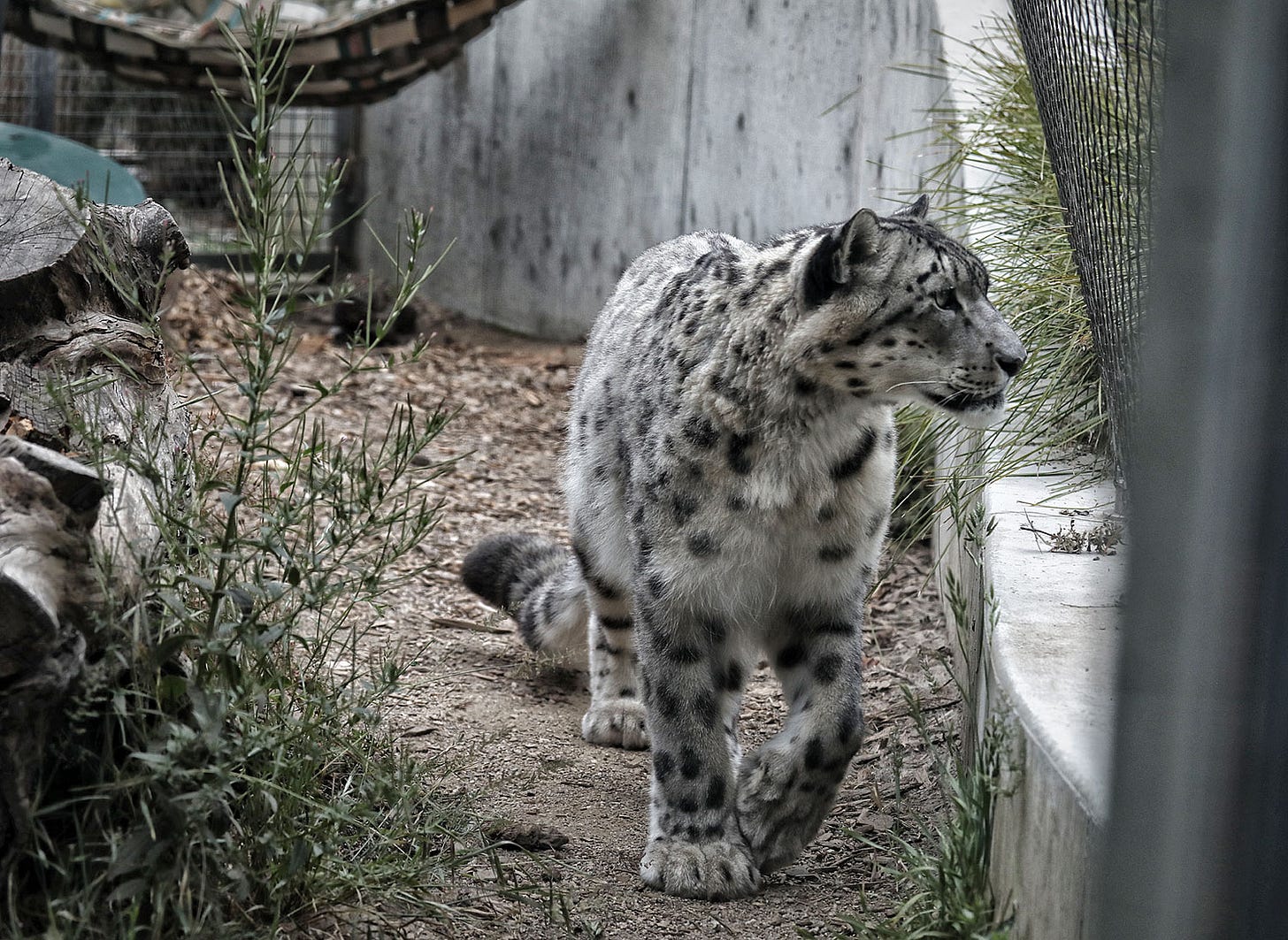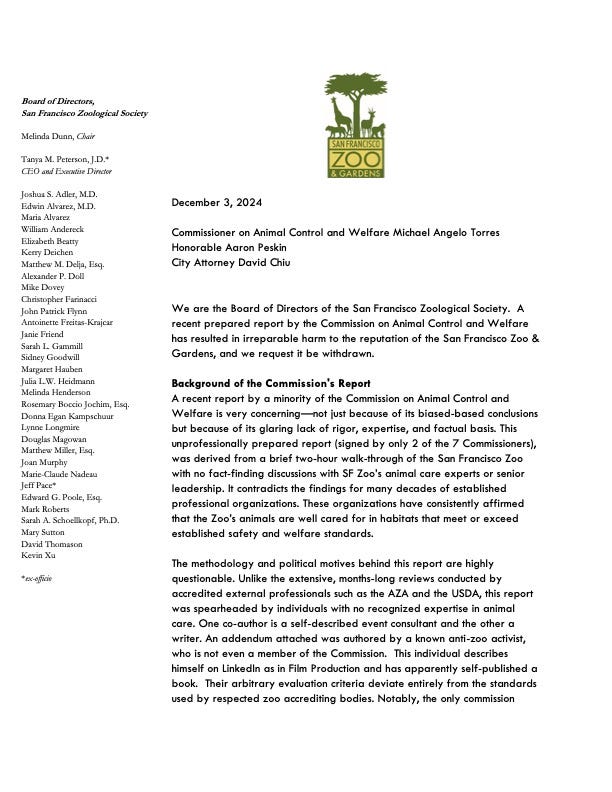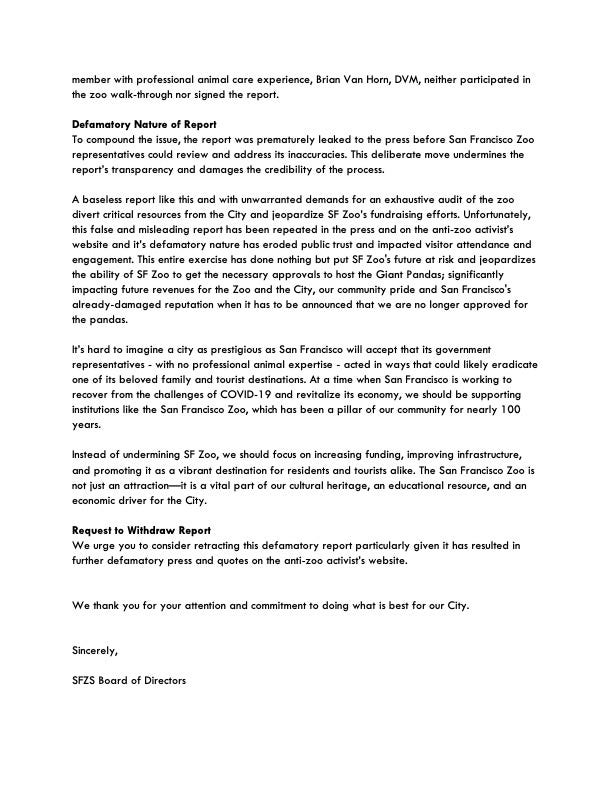SF Zoo Attempts to Retract Damning Report in Leaked Letter
SF Zoo Board Deflects Accountability and Dismisses Staff Concerns in Letter to City Officials

The San Francisco Zoo’s Board of Directors has issued a defensive response to a recent report from the San Francisco Commission on Animal Control and Welfare, which exposes troubling conditions at the nearly century-old institution. In a move that deflects accountability, the Board has dismissed concerns raised by current and former staff while attempting to discredit the report and retract its findings. This leaked letter underscores a troubling trend: leadership more focused on shielding itself from criticism than addressing the systemic issues necessary to improve animal welfare and rebuild public trust.
In a letter sent to city officials, the Zoo board labeled the report “biased,” “defamatory,” and “professionally unqualified,” demanding it be withdrawn:


Their claims hinge on the process: that the two-hour walk-through of the facility was superficial, that the commissioners lacked expertise, and that the findings undermined decades of external evaluations by respected organizations like the Association of Zoos and Aquariums (AZA) and the USDA.
However, beneath the rhetoric, the truth is clear: the report was not “leaked” but made public under California’s Public Records Act, which mandates transparency. Ironically, the San Francisco Zoo itself violates these laws, making their outrage over transparency both hypocritical and concerning.
A Report with a Purpose
The Commission’s report does not spring from anti-zoo sentiment, as alleged. To the contrary, it reflects a growing demand for transparency, ethical care, and forward-thinking management to create a better, modern zoo—one worthy of San Francisco’s legacy as a progressive and compassionate city.
Accusations that its authors are unqualified are both disingenuous and dismissive of their efforts. Expertise is not a monopoly held by a select group of accrediting agencies or long-standing zoo leadership. To equate critical oversight with inexperience is a deflection, ignoring the voices of concerned citizens, visitors, and experts who are pushing for meaningful reform.
And much of the information shared in the report—approximately 95%—came directly from current and former staff members of the San Francisco Zoo. These individuals are the frontline experts who witness the day-to-day realities of animal care and facility conditions. Their insights bring critical and credible concerns to light, issues that demand to be addressed rather than dismissed. This report serves as a vehicle for their voices, daylighting problems that too often remain hidden behind closed doors.
One striking claim by the board is that the report has inflicted “irreparable harm” on the Zoo’s reputation. But reputations are not harmed by facts or scrutiny—they are harmed when institutions resist introspection, accountability, and change.
The State of the San Francisco Zoo
The report’s concerns echo observations that many visitors have quietly murmured for years. Outdated enclosures, infrastructure in need of repair, and environments that fail to reflect modern best practices for animal welfare remain persistent issues.
While AZA and USDA accreditations provide a baseline, they are not indicators of excellence. Meeting minimum standards does not mean surpassing them, and San Francisco—a city of innovation and environmental consciousness—deserves to demand more from its cherished institutions.
As stewards of animal care and public trust, the Zoo’s leadership should welcome external critique as an opportunity for improvement. Instead, by focusing their ire on the report’s authors, the board sidesteps the report’s substance, opting to shoot the messenger.
Who Is an Activist?
The Zoo board’s letter repeatedly labels critics as “anti-zoo activists,” a term wielded to discredit those calling for reform. I reject that label. I am not anti-zoo—I am an advocate for a better zoo.
A “better zoo” is one that prioritizes:
Animal welfare with world-class, naturalistic habitats.
Modernized infrastructure that exceeds—not just meets—current standards.
Transparency and open dialogue with the public, including independent reviews.
Education and conservation programs that inspire the next generation of environmental stewards.
These goals are not radical. They are reasonable, necessary, and achievable. The Zoo board’s characterization of reform-minded advocates as adversaries reflects a failure to recognize that criticism can be a force for positive change.
The Future of the Zoo: Pandas and Beyond
The board’s letter ties its frustrations to the Zoo’s pursuit of Giant Pandas—a venture they claim will boost attendance and revenue. But San Francisco must ask itself a hard question: Are we ready to take on such a monumental responsibility when we cannot even address the systemic issues already exposed in this report?
The harsh reality of China’s panda program is far from the feel-good narrative it’s often portrayed to be. This initiative is not simply about conservation—it’s about optics, profit, and politics. Pandas are frequently treated as commercial pawns, leased under exorbitant contracts that funnel millions of dollars to China while distracting from the deeper failures of the zoos that host them. Instead of solving critical problems within our Zoo—such as outdated enclosures, infrastructure deficiencies, and inadequate care—this pursuit of pandas risks diverting attention and resources away from the animals already under its care.
San Francisco deserves more than a glossy spectacle meant to mask a crumbling foundation. If the Zoo cannot meet the highest standards for its current residents, what makes us believe it can handle the immense responsibility of hosting pandas? Bringing pandas here should not be used as a shiny distraction to silence valid concerns—it must be a mandate to address those issues first.
The Real Harm
The real harm to the San Francisco Zoo comes not from public reports but from a refusal to engage constructively with criticism. Defensive letters and dismissive rhetoric will not repair enclosures, improve animal welfare, or restore public confidence.
San Francisco deserves a zoo that reflects its values: a place where animals thrive, visitors learn, and the community unites around conservation and compassion. The path forward is not through denial but through reform, investment, and transparency.
A Call to Action
To the SF Zoo Board of Directors: Withdraw your demand for retraction and stop calling names. Instead, invite the report’s authors, independent experts, and members of the public to engage in a productive dialogue about the Zoo’s future. Demonstrate that you are willing to listen, adapt, and lead San Francisco Zoo into a new era of excellence.
To San Franciscans: Your voices matter. Support reform, demand transparency, and advocate for a Zoo that sets the standard for animal care and community engagement.
A better San Francisco Zoo is possible. But first, we must acknowledge that it is needed.


